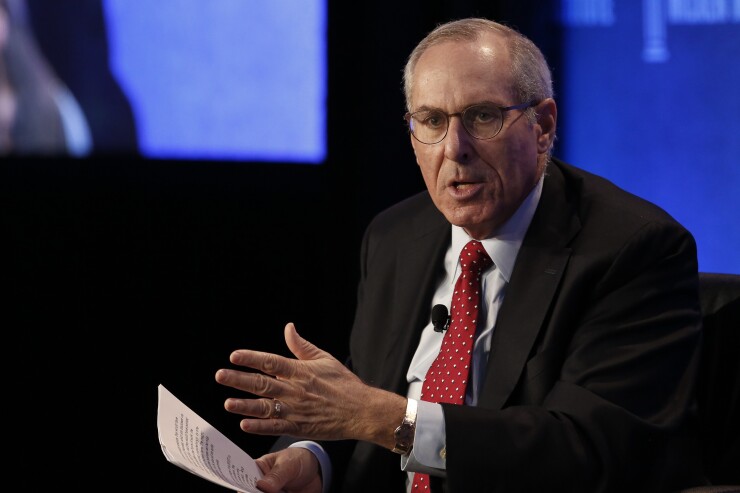Regulators want Fannie Mae and Freddie Mac to build up massive amounts of capital before being freed from government control. Freddie's outgoing chief executive officer says that's easier said than done.
Don Layton, who plans to step down July 1, said Tuesday that a capital plan issued a year ago by the companies' regulator would require the mortgage giants to raise a combined $125 billion, in part by selling shares. To underscore how big a figure that is, Layton noted that the biggest initial public offering ever was Alibaba Group Holding Ltd.'s, in which the online retailer raised $25 billion.

Layton, speaking at a Federal Reserve conference in Florida, said it might take a stock sale and four to five years of Freddie retaining earnings to get to the $50 billion capital level envisioned under the Federal Housing Finance Agency's June 2018 proposal. He also questioned whether any unresolved issues — such as the federal government's huge stakes in Fannie and Freddie — might dampen investor demand for the companies' shares should they hold IPOs.
"This is unprecedented to my knowledge," Layton said.
The comments provide some insight into why Congress has failed for more than a decade to agree on a plan for fixing Fannie and Freddie, and why the Trump administration will face hurdles in its current push to end their conservatorships. The companies, which backstop about $5 trillion of mortgage securities, received a taxpayer bailout and were taken over by the government at the height of the 2008 financial crisis.
Fannie and Freddie don't issue mortgages. Instead, they buy loans from lenders and package the debt into bonds that are sold to investors with guarantees of interest and principal. The process makes housing more affordable, while keeping the mortgage market humming.
FHFA Director Mark Calabria said in a Monday speech that he's determined to free Fannie and Freddie from federal control, and that doing so will be "driven, first and foremost, by their ability to raise capital." To protect against losses, he said he wants them to have buffers that are essentially the same as giant Wall Street banks.
While Calabria hasn't laid out a clear plan for how he envisions Fannie and Freddie getting to his desired capital levels, he said it will require ending a 2012 policy implemented by the Obama administration that forces the companies to send their profits to the Treasury. He added that holding a "public offering of some kind" will probably be necessary.




